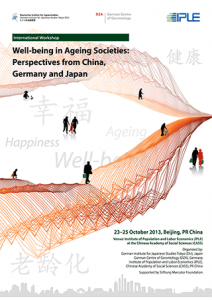
Download
Berichte
Co-organizer
German Centre of Gerontology (DZA), Germany; Institute of Population and Labor Economics (IPLE), Chinese Academy of Social Sciences (CASS) PR China
International Workshop
Well-being in Ageing Societies: Perspectives from China, Germany and Japan
23. Oktober - 25. Oktober 2013
The overall aim of this workshop is to bring together international experts studying the relationship between objective and subjective well-being and older adults/ageing societies in various fields to present their latest ideas and empirical research in order to help develop an agenda for future research on well-being in the ageing society. The discussion will focus on China, Japan, and Germany, as these societies represent different stages of economic development, speed of demographic change, cultural values concerning families and older people, and social policies which vary widely due to specific circumstances and historical path dependence. We plan to discuss three general questions:
- How do well-being, satisfaction, and happiness change over the life course in China, Japan, and Germany?
- What are the individual, economic, and societal factors that affect well-being, satisfaction, and happiness of older adults in China, Japan, and Germany?
- Which societal institutions, cultural frameworks and social policies help to enhance the well-being, satisfaction, and happiness under conditions of population ageing in China, Japan and Germany?
After comparing the demographic situation in China, Japan, and Germany, empirical evidence on psychological well-being over the life course in these three countries will be discussed, concentrating on the individual factors that influence life satisfaction and happiness as people age. We will then move on to discuss the role of societal and economic factors for subjective well-being. Finally, we will focus on policies for active ageing and well-being in ageing societies. We hope that the comparative perspective of the workshop will be productive for learning from each other in terms of general challenges and opportunities that China, Japan, and Germany are facing due to demographic and social changes. Despite the many differences between the three countries in regards to economic development, social structure and political system notwithstanding, they share the challenge of rapid population ageing.
The presentations are intended to stimulate discussion of research topics, methods and ideas that could suggest new avenues for studying the well-being of people in ageing societies from a cross-cultural perspective. Hence, the presentations should be brief and concise (10 minutes maximum) and focus on the three questions posed above. (a) life course trajectories of well-being; (b) individual, economic, and societal factors affecting well-being in late life; (c) institutions, cultural values, economic factors and social policies enhancing well-being.
The workshop is expected to facilitate future collaborative studies among participants. By focusing on the discussion among experts from various disciplines we hope to encourage the cross-pollination among disciplines and leverage the creative potential of our cross-national and multi-disciplinary setting.
Supported by
Stiftung Mercator Foundation
Vorträge
Tag 1 23. Oktober (Mittwoch)
18:00 – 19:30
Welcome and Keynote Panel
Prof. Dr. Fang Cai, Director of IPLE-CASS, PR China
Prof. Dr. Clemens Tesch-Roemer, Director, DZA, Germany
Prof. Dr. Florian Coulmas, Director, DIJ, Japan
Dr. Florian Kohlbacher, Head of Business & Economics Section, DIJ, Japan
Prof. Dr. Takanori Shibata, National Institute of Advanced Industrial Science and Technology (AIST), Japan
Prof. Dr. Zhenzhen Zheng, Professor, IPLE-CASS, PR China
Prof. Dr. Ursula Lehr, President, BAGSO, the German National Association of Senior Citizens’ Organizations, Germany
Prof. Dr. Clemens Tesch-Roemer, Director, DZA, Germany
Prof. Dr. Hiroko Akiyama, University of Tokyo, Japan
19:30 – 21:00
Welcome Reception
Tag 2 24. Oktober (Donnerstag)
09:00 – 09:15
Keynote Speech
Dr. Xiao Caiwei, Vice President, China National Committee on Ageing
09:15 – 10:45
Session I: The Individual (Psychological issues)
Prof. Dr. Clemens Tesch-Roemer, Director, DZA, Germany
Prof. Dr. Buxin Han, Institute of Psychology, Chinese Academy of Sciences, China Prof.
Dr. Michael Eid, Faculty of Education and Psychology, Free University Berlin, Germany
Prof. Dr. Hiroshi Shibata, University of Human Arts and Sciences, Japan
10:45 – 11:15
Coffee Break
11:15 – 12:45
Session II: The Society (Sociological issues)
Prof. Dr. Hiroko Akiyama
Dr. Xuejin Zuo, Shanghai Academy of Social Sciences, China
Dr. Andreas Motel-Klingebiel, DZA, Germany
Prof. Dr. Takako Sodei, Ochanomizu University
12:45 – 14:00
Lunch Break
14:00 – 15:30
Session III: The Economy (Economic and business issues)
Dr. Xuejin Zuo, Shanghai Academy of Social Sciences, China
Prof. Dr. Jiehua Lu, Department of Sociology, Peking University, China
Prof. Dr. Axel Boersch-Supan, Max Planck Institute for Social Law and Social Policy, Munich Center for the Economics of Aging, Germany
Dr. Florian Kohlbacher, DIJ, Japan
15:30 – 16:00
Coffee Break
16:00 – 17:30
Session IV: Technology
Dr. Florian Kohlbacher
Dr. Ke Chen, Department of Systems Engineering and Engineering Management, City University of Hong Kong, China
Dr. Birgid Eberhardt, SIBIS, Germany
Dr. Ryoko Fukuda, Department of Environment and Information Studies, Keio University, Japan
Tag 3 25. Oktober (Freitag)
09:00 – 10:30
Session V: Actively designing Well-being in Ageing Societies (Policy issues)
Prof. Dr. Axel Boersch-Supan
Prof. Dr. Jian Song, Population and Development Center, Renmin University, China
Prof. Dr. Takeo Ogawa, Kumamoto Gakuen University, Japan
Dr. Frank Berner, DZA, Germany
10:30 – 11:00
Coffee Break
11:00 – 12:30
Session VI: Discussion and Wrap-Up
Facilitators:
Prof. Dr. Zhenzhen Zheng, Professor, IPLE-CASS, PR China
Prof. Dr. Florian Coulmas, Director of DIJ, Japan